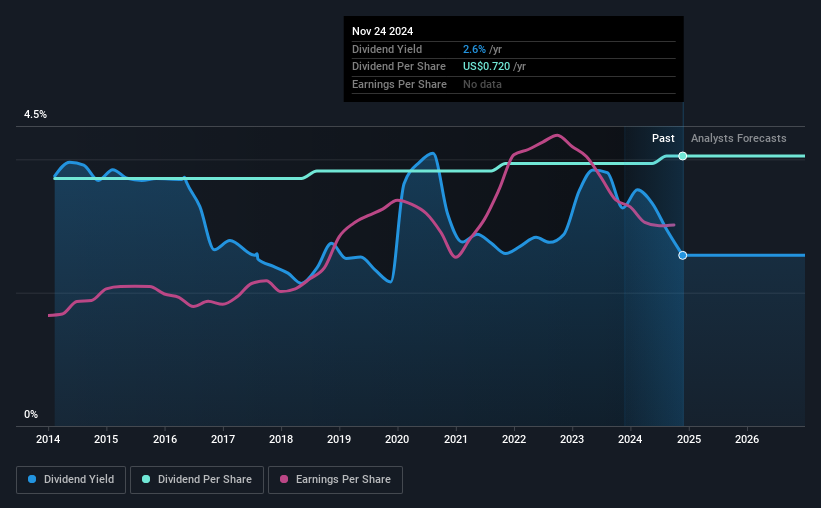- United States
- /
- Banks
- /
- NasdaqGS:CCNE
CNB Financial (NASDAQ:CCNE) Could Be A Buy For Its Upcoming Dividend

Readers hoping to buy CNB Financial Corporation (NASDAQ:CCNE) for its dividend will need to make their move shortly, as the stock is about to trade ex-dividend. The ex-dividend date is usually set to be one business day before the record date which is the cut-off date on which you must be present on the company's books as a shareholder in order to receive the dividend. The ex-dividend date is important as the process of settlement involves two full business days. So if you miss that date, you would not show up on the company's books on the record date. Accordingly, CNB Financial investors that purchase the stock on or after the 29th of November will not receive the dividend, which will be paid on the 13th of December.
The company's next dividend payment will be US$0.18 per share, on the back of last year when the company paid a total of US$0.72 to shareholders. Based on the last year's worth of payments, CNB Financial has a trailing yield of 2.6% on the current stock price of US$28.13. Dividends are an important source of income to many shareholders, but the health of the business is crucial to maintaining those dividends. So we need to check whether the dividend payments are covered, and if earnings are growing.
See our latest analysis for CNB Financial
Dividends are typically paid from company earnings. If a company pays more in dividends than it earned in profit, then the dividend could be unsustainable. That's why it's good to see CNB Financial paying out a modest 30% of its earnings.
Generally speaking, the lower a company's payout ratios, the more resilient its dividend usually is.
Click here to see the company's payout ratio, plus analyst estimates of its future dividends.

Have Earnings And Dividends Been Growing?
Stocks with flat earnings can still be attractive dividend payers, but it is important to be more conservative with your approach and demand a greater margin for safety when it comes to dividend sustainability. If earnings decline and the company is forced to cut its dividend, investors could watch the value of their investment go up in smoke. With that in mind, we're not enthused to see that CNB Financial's earnings per share have remained effectively flat over the past five years. Better than seeing them fall off a cliff, for sure, but the best dividend stocks grow their earnings meaningfully over the long run.
Many investors will assess a company's dividend performance by evaluating how much the dividend payments have changed over time. Since the start of our data, 10 years ago, CNB Financial has lifted its dividend by approximately 0.9% a year on average.
The Bottom Line
Has CNB Financial got what it takes to maintain its dividend payments? Earnings per share have been flat in recent years, although CNB Financial reinvests more than half its earnings in the business, which could suggest there are some growth projects that have not yet reached fruition. Overall, CNB Financial looks like a promising dividend stock in this analysis, and we think it would be worth investigating further.
Wondering what the future holds for CNB Financial? See what the two analysts we track are forecasting, with this visualisation of its historical and future estimated earnings and cash flow
Generally, we wouldn't recommend just buying the first dividend stock you see. Here's a curated list of interesting stocks that are strong dividend payers.
New: AI Stock Screener & Alerts
Our new AI Stock Screener scans the market every day to uncover opportunities.
• Dividend Powerhouses (3%+ Yield)
• Undervalued Small Caps with Insider Buying
• High growth Tech and AI Companies
Or build your own from over 50 metrics.
Have feedback on this article? Concerned about the content? Get in touch with us directly. Alternatively, email editorial-team (at) simplywallst.com.
This article by Simply Wall St is general in nature. We provide commentary based on historical data and analyst forecasts only using an unbiased methodology and our articles are not intended to be financial advice. It does not constitute a recommendation to buy or sell any stock, and does not take account of your objectives, or your financial situation. We aim to bring you long-term focused analysis driven by fundamental data. Note that our analysis may not factor in the latest price-sensitive company announcements or qualitative material. Simply Wall St has no position in any stocks mentioned.
About NasdaqGS:CCNE
CNB Financial
Operates as the bank holding company for CNB Bank that provides a range of banking products and services for individual, business, governmental, and institutional customers.
Undervalued with high growth potential and pays a dividend.
Similar Companies
Market Insights
Community Narratives




